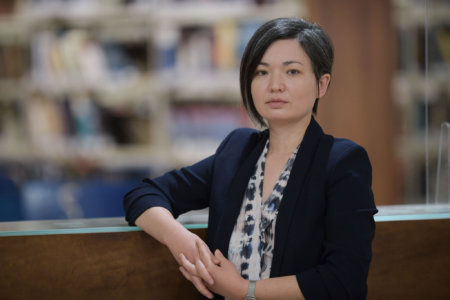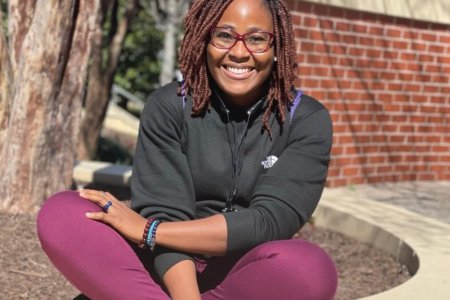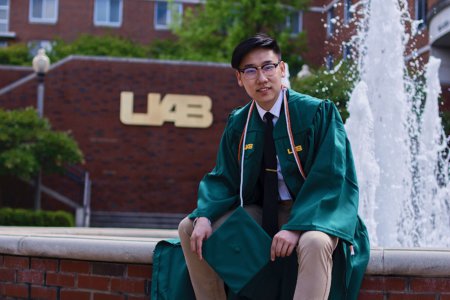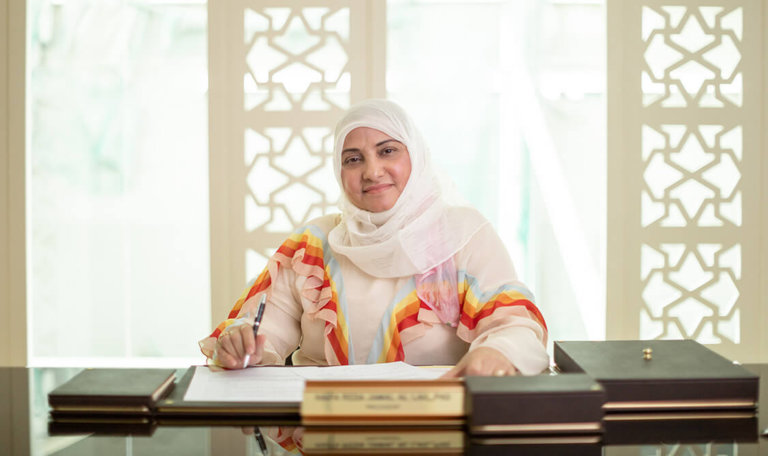
Saudi Arabia made headlines worldwide in 2017 when Crown Prince Mohammed bin Salman came to power with a surprising string of reforms. Two years ago, he introduced new freedoms for females travelling alone, allowing them to get passports and travel abroad without the consent of male guardians. There are no definite studies yet, but analysts suggest these reforms could be the reason behind the surge in the labor force participation rate of Saudi women from 20% in late 2018 to 33% by the end of 2020.
Here is where Dr. Haifa Reda Jamal al-Lail, president of Effat University (a private non-profit institution for women in Saudi Arabia), comes in. The PhD in public policy graduate from the University of Southern California was previously the first Dean of Women’s Campus in King Abdulaziz University, Saudi Arabia, a position she held concurrently with her consultant role for Princess Lolowah Al Faisal (a member of the ruling Saudi royal family and prominent advocate for women’s education).
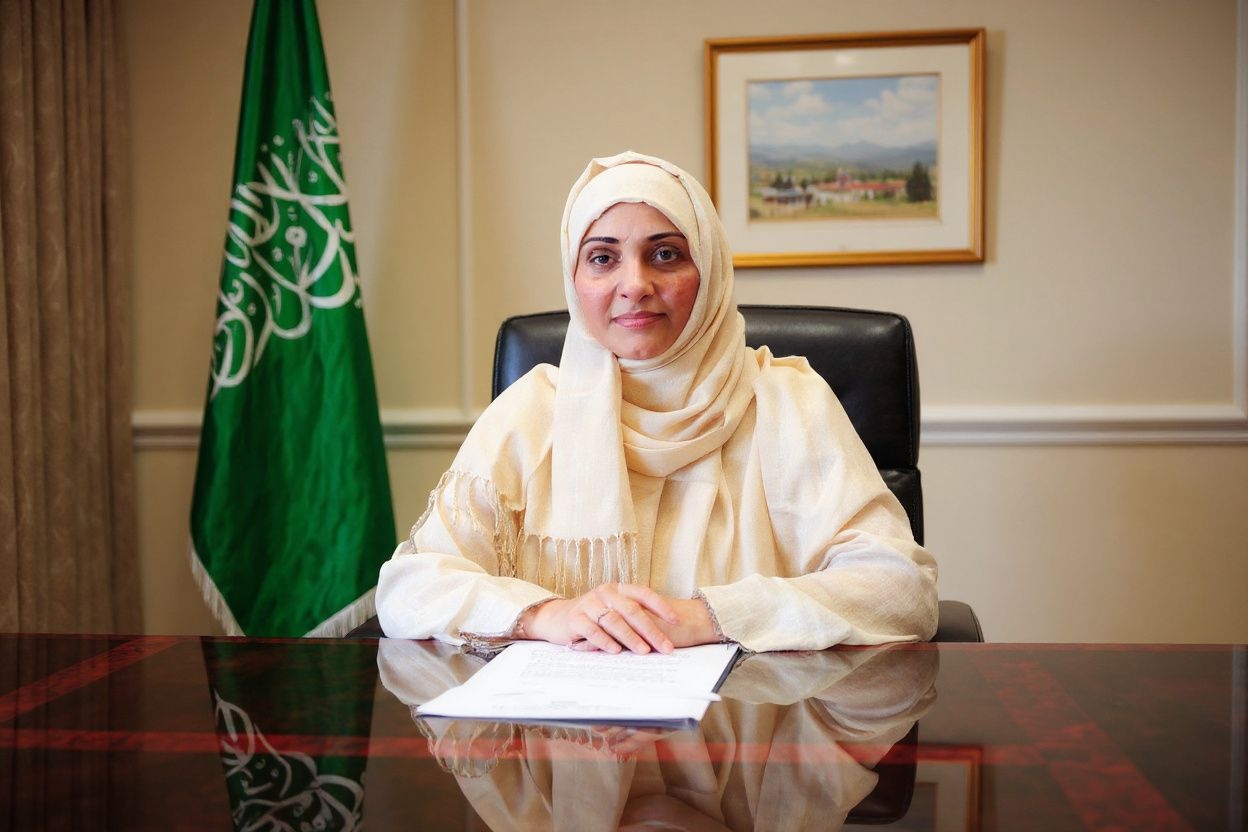 Dr. Haifa Reda Jamal al-Lail, President of Effat University, at her office.Although she has a string of awards to her name — including the Kingdom Women in Leadership Award, the Distinguished Arab Woman Award and 1000 Women for the Nobel Peace Prize nomination — she knows there’s still a lot more to do. We caught up with Jamalallail to learn more about her views on bridging the gender gap in the educational industry and her study abroad experience in the US:
Dr. Haifa Reda Jamal al-Lail, President of Effat University, at her office.Although she has a string of awards to her name — including the Kingdom Women in Leadership Award, the Distinguished Arab Woman Award and 1000 Women for the Nobel Peace Prize nomination — she knows there’s still a lot more to do. We caught up with Jamalallail to learn more about her views on bridging the gender gap in the educational industry and her study abroad experience in the US:
What made you choose to pursue your PhD in Public Policy in the US?
The degree in public policy prepared me to analyse our Saudi and Arab community problems. I wanted to influence lawmaking at a local, regional and international level. I was targeting private and non-profit sectors in my country (which back then was growing at a slow pace).
To be able to contribute to their growth, public policy as a field of study helped me understand these sector’s behavioural changes and acknowledge the importance of policy formulation for their existence and sustainability.
I therefore chose to take my PhD at the Sol Price School of Public Policy at the University of Southern California (USC). This is because the programme blends political science, sociology and data analytics which helped me build skills in critical thinking and decision-making.
I am also an ambitious person. I wanted to broaden my horizons and I believe that my beloved country will open the conservative kingdom up to the outside world. I must be ready for that!
You’ve made history as one of the first women to be president of a higher institution (Effat University). What are some of the challenges you face and how do you overcome them?
According to a 1996 report from the Ministry of Education, women represent just 30% of Saudi college presidents. Saudi women leaders are often expected to be both personable and authoritative, both analytical and affable, and warm and clearly commanding. These conflicting expectations can lead people to evaluate us as leaders based on our personal traits rather than the quality of work.
Saudi higher ed leaders encountered stereotypes by cultivating an environment where people were judged on the merits of their work and not their gender. We have granted permission to our colleagues (and students) to forge a path that is defined by their abilities.
One of the biggest challenges I faced was the need to wrench open doors that would automatically be open for my male counterparts. In the 90s, the physical presence of women on business premises was a new and bold step.
Up until then, the only women in the Saudi workforce were teachers or medical staff in hospitals. Initially, the idea of females leading education faced strong resistance from our conservative society and it became a hotly contested issue.
I had to consciously interject myself into conversations at public events and find ways for one-on-one conversations with my male counterparts to achieve what they — as male presidents in my area — could with less effort. In 1998, there was a sea change in female higher education. The government provided women with opportunities in this industry to allow them to contribute to nation-building with diligence and efficiency.
How are you bridging the gender gap in the world of academia? What do you think should be done to encourage women in leadership roles?
I am not the typical college president. I see myself as a change agent. This style of leadership tends to be accepted by male leaders but brings confusion when it emanates from a female. Women leaders should set the tone for their institutions and demonstrate what strong, imaginative female leaders can do once they have power and authority.
The work on bridging the gender gap starts from birth onwards. Parents need to make their children aware that there is no difference in what boys and girls can achieve. This needs to be reinforced in education where both boys and girls need to be exposed to strong competent female role models.
Women need to be able to (and encouraged) to study all majors and work in all fields at all levels. Legislation can help here but the most important thing is the societal acceptance of women as equal partners. This is changing now and the younger generation will make sure this gender gap closes.
What were the practical learning elements in your PhD? Do you get to apply them to your current job?
My dissertation was not just theoretical, it was also a practical analysis of how to transform a static, nationalised entity into a dynamic private enterprise. In my current role at Effat University, I am constantly striving to transform education in line with the changing needs and expectations of society. So although the parametres differ, the principles are similar.
 Saudi students from Effat University are seen at a booth promoting their Visual and Digital Production programme at the Saudi Film Festival in the Gulf coast city of Dammam. Officially it's not called "filmmaking" because public cinemas are banned in Saudi Arabia. But making movies is exactly what about 150 female students are doing at the kingdom's all-female Effat University.
Saudi students from Effat University are seen at a booth promoting their Visual and Digital Production programme at the Saudi Film Festival in the Gulf coast city of Dammam. Officially it's not called "filmmaking" because public cinemas are banned in Saudi Arabia. But making movies is exactly what about 150 female students are doing at the kingdom's all-female Effat University.
As a woman with many prestigious awards, you are setting an example for all aspiring women with goals towards education and leadership roles. Tell us more about your Nobel Peace Prize.
So many ordinary women commit themselves on a daily basis to the cause of peace and justice and yet their contributions often go unacknowledged. They are overshadowed by more dramatic, newsworthy efforts of male leaders.
The nomination of 1000 Women for Peace was an attempt to redress this balance and shine a light on the work done in local communities to build and rebuild in recognition of their daily commitment. This was done to improve living conditions for present and future generations.
The number 1000 was symbolic, to represent the innumerable women who are actively engaged in the cause of peace and human dignity. It was a great honour to be included in this inspiring group.
What is your advice for students who wish to study abroad?
If you have the chance, take it! Studying abroad widens your horizons in so many ways. You learn so much and not just about your chosen field of study, but also about yourself. You come back stronger, more determined and more aware of all the choices and possibilities available.
Also, think about challenging yourself to go somewhere outside of your comfort zone and away from “holiday” destinations. Asia, Africa, and Latin America all have a lot to offer. It doesn’t always have to be the US or Europe. The more you stretch yourself, the more you will grow.
What do you envision for your future in 10 years?
Saudi Arabia is and will always be my home. In 10 years time, I hope to still be enjoying good health and the support of my family as I continue to contribute to the development of the country in any way I can.








